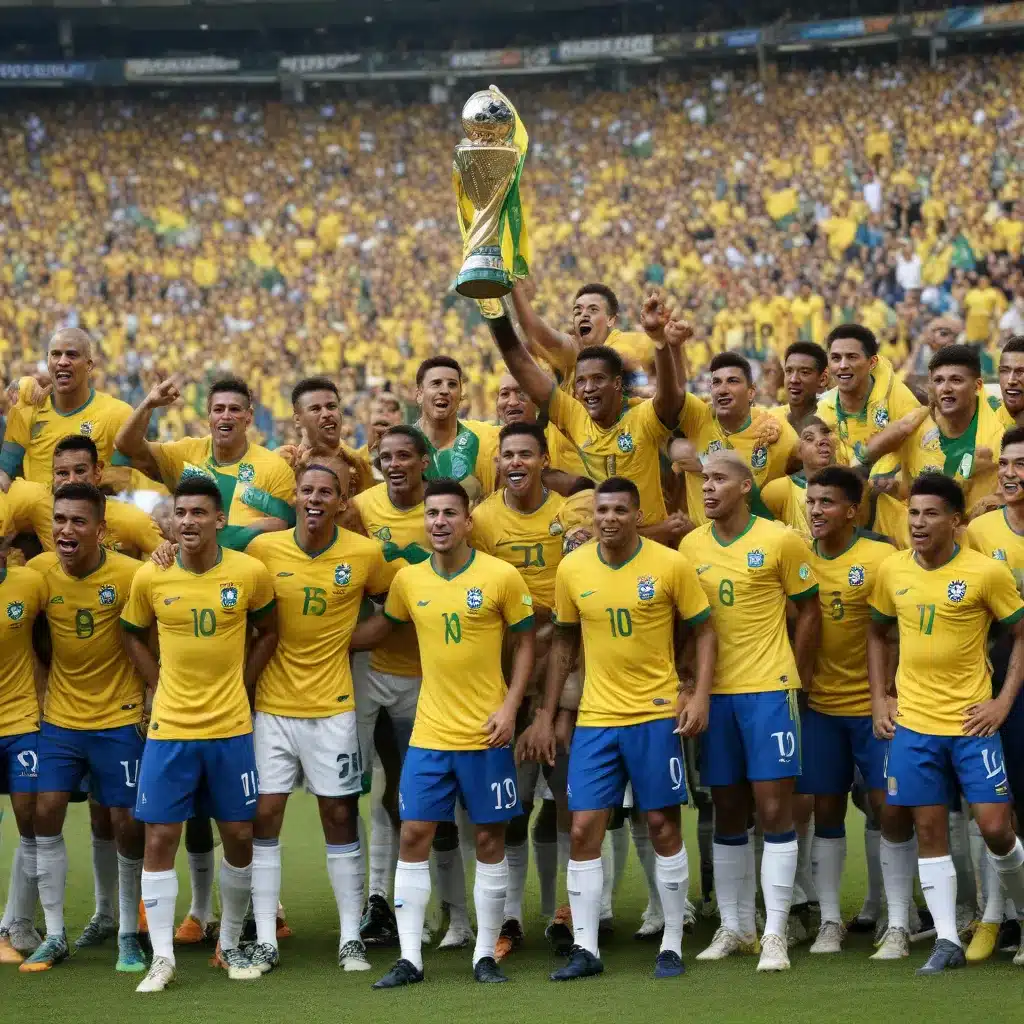
Brazilian Football Tradition
Origins and Development
Brazilian football has a rich history that stretches back to the late 19th century, when the game was first introduced to the country by European immigrants. Over the decades, the sport has become deeply ingrained in the nation’s cultural fabric, evolving into a unique style that sets it apart from the rest of the world.
At the heart of this tradition lies a passionate, creative, and free-flowing approach to the game. The “jogo bonito” (the beautiful game) philosophy emphasises individual flair, improvisation, and a rhythmic fluidity that draws inspiration from the country’s vibrant samba culture. This style has captivated audiences worldwide, making Brazilian football synonymous with artistry and entertainment.
Tactical Innovations
The Brazilians have not only delighted fans with their attacking prowess but have also revolutionised the tactical landscape of the game. One of the most significant innovations was the emergence of the libero (sweeper) role, pioneered by the legendary Franz Beckenbauer. This defensive player, often considered the “first among equals” in the backline, had the freedom to initiate attacks and dictate the flow of the game.
Another pivotal development was the rise of the goalkeeper-libero, embodied by the charismatic René Higuita. Higuita’s unorthodox playing style, which saw him venture far outside his penalty area, challenged the traditional role of the goalkeeper and paved the way for a new generation of “sweeper-keepers” who are comfortable with the ball at their feet.
Influential Players and Coaches
The pantheon of Brazilian football is adorned with some of the most iconic players in the sport’s history. Pelé, the three-time World Cup winner, is universally regarded as one of the greatest footballers of all time. His dazzling skills, creativity, and goal-scoring prowess defined the essence of the “jogo bonito.”
Alongside Pelé, other legends such as Garrincha, Zico, Romário, and Ronaldinho have captivated global audiences with their unparalleled individual brilliance and ability to elevate the collective performance of their teams.
The influence of Brazilian coaches has also been pivotal in shaping the tactical evolution of the game. Luiz Felipe Scolari, who guided Brazil to World Cup glory in 2002, demonstrated the country’s ability to blend its traditional flair with a more pragmatic, disciplined approach when necessary.
Tactical Evolution of Global Football
Possession-Based Approach
The foundations of Brazilian football have had a profound impact on the global game, with their emphasis on possession and ball control becoming a hallmark of many successful teams around the world. The tiki-taka style pioneered by Barcelona and the Spanish national team, for instance, can be traced back to the fluid, pass-and-move philosophy that has defined Brazilian football for generations.
Flair and Creative Play
The creative and improvisational nature of Brazilian football has also influenced the way the game is played globally. Coaches and players from various nations have sought to emulate the flair, individual skill, and attacking prowess that has made Brazilian teams so captivating to watch.
Defensive Strategies
While the Brazilians are renowned for their offensive brilliance, they have also made significant contributions to the defensive side of the game. The libero role, as pioneered by Beckenbauer, has become a staple in many modern defensive systems, with players tasked with organising the backline and initiating attacks from deep.
Impact on Coaching Methodologies
Emphasis on Technical Skills
The Brazilian approach to football development has emphasised the importance of technical mastery from a young age. This focus on honing individual skills, such as dribbling, first touch, and ball control, has been widely adopted by academies and youth development programs around the world, producing a new generation of technically proficient players.
Adaptability and Flexibility
The ability of Brazilian teams to adapt their tactics and playing styles to different situations has been another key factor in their global influence. This flexibility, coupled with a willingness to innovate, has inspired coaches to reevaluate their own approaches and embrace a more dynamic, context-sensitive model of the game.
Youth Development Philosophies
Brazil’s success in consistently producing world-class talents has been underpinned by a robust youth development system. The country’s emphasis on nurturing raw talent, fostering creativity, and providing opportunities for young players to thrive has become a blueprint for football academies worldwide.
Enduring Legacy and Influence
Cultural Significance
Brazilian football’s impact extends far beyond the pitch, as the sport has become deeply intertwined with the nation’s cultural identity. The rhythmic flow of the “jogo bonito” is often compared to the samba, reflecting the country’s vibrant and celebratory spirit. This cultural fusion has contributed to the global popularity and appeal of Brazilian football.
Worldwide Popularity
The allure of Brazilian football has transcended geographical boundaries, captivating fans and inspiring players across the globe. The national team’s dominance in the FIFA World Cup, with a record five titles, has cemented Brazil’s status as a footballing superpower, while the country’s club teams, such as Flamengo, Corinthians, and São Paulo, have amassed a loyal following worldwide.
Continuing Innovations
As the game continues to evolve, the influence of Brazilian football remains evident in the latest tactical and technical developments. The emergence of modern sweeper-keepers like Ederson and Alisson, who seamlessly integrate the goalkeeper and libero roles, can be seen as the next evolution of the blueprint first laid out by Higuita.
The enduring impact of Brazilian football on the global game is undeniable. From its origins in the late 19th century to its current status as a cultural and sporting powerhouse, the country’s unique approach to the beautiful game has left an indelible mark on the sport, inspiring generations of players, coaches, and fans alike. As the world of football continues to progress, the influence of Brazilian football is sure to remain a guiding light, shaping the tactical and creative landscape of the game for years to come.

